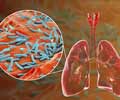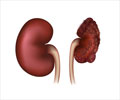Scientists have discovered a new process by which tuberculosis puts the brakes on our immune engines.

‘A small RNA molecule (which comprises tiny pieces of genetic information) which the TB bacterium promotes and targets key enzymes that act as pumps in our immune engines to commit glucose to promote the anti-bacterial response has been identified.’





Part of TB's success as a pathogen is because of its ability to infect the cells of our immune system, which are normally tasked with responding to the infection. It infects our lung macrophage cells and then manipulates them to its benefit - creating a safe home for it to hide out unperturbed, sometimes for years.As part of an SFI-funded Starting Investigator Research Grant, Frederick Sheedy, Ussher Assistant Professor in the School of Biochemistry and Immunology at Trinity, mentored by St James' Hospital TB specialist, Professor Joseph Keane, has been examining how these lung macrophage immune cells fuel the fight against infection.
The work has been at the forefront of showing how the simple sugar glucose is used to promote the macrophages anti-bacterial activities.
In surprising results, published this week in leading international journal Cell Reports, Dr Emer Hackett (a PhD candidate in Professor Sheedy's group) found that persistent infection of these macrophages with TB puts the brakes on the glucose-fuelled engine. This essentially shuts down our natural response to infection, which allows the bacteria to hide out unperturbed.
When the bacteria promotes this small RNA molecule, which is termed microRNA-21, these enzyme pumps are removed from the engine and glucose is not used in the same way. This then allows the bacteria to escape and thrive.
Advertisement
Professor Sheedy explained:
Advertisement
"What is particularly promising from a societal impact perspective is that as well as increasing our knowledge of how TB corrupts our normal immune response to infection, our identification of the microRNA-21 means that scientists should be able to develop improved immunotherapies or vaccine strategies to help in the fight against TB infection."
Source-Eurekalert















